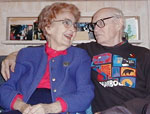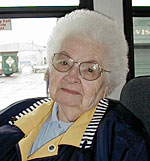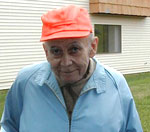Help for an 'Independent Bunch'
By Stephanie Hemphill
June 2001
Demographers and state planners are worrying about dramatic shifts in Minnesota's population, with younger workers moving to the Twin Cities metro area and older people concentrating in rural areas. Are small towns ready for an aging population? Will there be enough young people to take care of the older people?
Scenic Cook County, along the north shore of Lake Superior, has only about 5,000 year-round residents. Nearly 1,000 of them are older than 65. And many summer visitors are moving there to retire.
| |
|
|
|
||
That's the story for George Beck, a regular passenger on the Arrowhead transit bus. The bus has a regular route in Grand Marais, and swings through other parts of the county once a week. Its most loyal riders are senior citizens. George Beck takes the bus to the bank, the store, the post office. And - every day - to the senior center in the heart of town.
The center is a well-decorated, modern building full of windows, with two huge aquariums near the entrance. The kitchen serves up midday meals to as many as 30 seniors Monday through Friday. In the living room area, Wednesday afternoons are devoted to bridge. The center welcomes other community activities, everything from a square dance club to AA meetings.
Sharon Bloomquist, who runs the center these days, used to drive the Arrowhead transit bus. One of her favorite riders was Charlie Cook. He lived in the remote wilderness north of town. Bloomquist says he paddled his canoe across a lake to meet the bus every week.
"The roads were really icy one day when I was up there, we came around the corner and there were several moose on the road. And I started pumping the brakes and the moose started running and their legs were flying, there was a million legs in the air, and he says in his quiet way, 'Take the little one, Sharon, we can't handle the big one.'"
Charlie Cook is dead now, and so are most of the other pioneers who lived in solitary shacks in the woods. There used to be a lot of them, but Sharon Bloomquist says more seniors live in town now. They're healthier and wealthier, and many still drive. That means there are fewer people to help pay for the expenses of running the bus.
"It gets to be a real challenge to keep everything that people need. It's just as important for one person to get to the doctor as for 100 people to get to the doctor," she says.
In Cook County, the nearest full-service medical hub is more than 100 miles away, in Duluth. The bus goes to Duluth twice a month, but not everyone can work their appointments around the bus schedule.
Harvey Turner has a heart condition and two forms of cancer, and his wife Lois has a bad back and congestive heart failure.
| |
|
|
|
||
Sometimes her daughter comes from Michigan to help out, but usually they depend on the volunteer drivers. People without family nearby need these organized programs more than those with children or other relatives in town.
Bob Simpson, a retired minister who moved to Grand Marais with his wife, Anne, seven years ago, has Alzheimer's, and he needs someone with him all the time. Their closest children are in the Twin Cities, so Anne is getting help from a respite program. Once a week someone comes to do light housework while Anne goes out. But Anne Simpson says it's time to move to Duluth, where she can get Bob into a program specifically for Alzheimer's patients. She pats her dog Sky and says even he can come along.
"I would like to be in a place where there would be day care, a place where he could go and be with the same ongoing professional staff. Respite care is wonderful but the people keep changing and every change is a confusion for him," Anne Simpson says.
But Anne Simpson says it breaks her heart to have to leave the many friends who have helped here in Grand Marais. Friends like Al Evenson, a lay minister who conducts a men's bible study class.
"Every Wednesday he takes Bob out for lunch and they discuss the lesson for the next day and Bob can give his insights. He is still able to talk about philosophical and theological insights. And so he helps Al and Al certainly helps him to feel needed. And they enjoy each other's company."
One of the senior apartment buildings in Grand Marais is right next to the hospital, which also operates a home health care agency. Some social workers say it would be easy to turn the building into an assisted living center, with housekeeping help, a daily meal, and help with medications. So far it's just an idea, and not everyone thinks it's a good one.
| |
|
|
|
||
Cook County's seniors are an independent bunch. Retired social worker Lois Johnson, who now heads a program called SAIL - Seniors Agenda for Independent Living - says professionals and volunteers work creatively to put services together, with the county's limited funding and small population base. So she's delighted when people use them - like one 90-year-old man who lost his wife recently.
"He got through the funeral and he came down here and said 'Well I'm going to be here every day from now on. I know what I need and I need to be here.' And it's a real checks and balance. He comes, if he doesn't cancel his lunch, and says 'I'm going to be in Duluth' or 'I'm not going to be around,' and if he doesn't show up, we go looking for him," Johnson says.
The population of Minnesota as a whole is getting older, and the changes in Cook County will continue. Johnson and her colleagues recently conducted a survey of people with summer cabins in the county, and hundreds of them said they plan to retire here.
Johnson says those mostly wealthy baby-boomers will expect a comfortable life with a lot of amenities. She's working with others to plan for the influx, and to come up with more creative ways of meeting the needs of all the county's elderly residents.
Next: Time to Live



